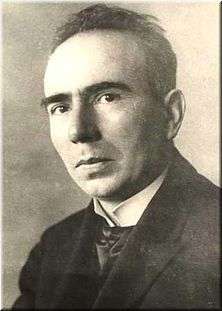Vasile Pârvan
| Vasile Pârvan | |
|---|---|
|
Vasile Pârvan | |
| Born |
28 September 1882 Perchiu, Huruiești, Bacău, Romania |
| Died |
26 June 1927 (aged 44) Bucharest, Romania |
| Citizenship | Romanian |
| Nationality | Romanian |
| Fields | History, Archaeology |
| Institutions | Romanian Academy |
| Known for | Getica, research on Dacia |
Vasile Pârvan (Romanian pronunciation: [vaˈsile pɨrˈvan]; 28 September 1882, Perchiu, Huruiești, Bacău – 26 June 1927, Bucharest) was a Romanian historian and archaeologist.
He studied history in Bucharest, with Nicolae Iorga as one of his professors. He continued his studies in Germany. His Ph.D. thesis, written in 1909, was titled The nationality of merchants in the Roman Empire. He became professor at the University of Bucharest, and was elected member of the Romanian Academy.
His main interests were in prehistoric archaeology and classical antiquity. He organized several archaeological excavations, the most important one being at Histria, from 1914 to 1927.
Some of his most important works includes Getica, where he described the political and cultural role of Getae-Dacians.[1]
Vasile Pârvan was the main promoter for the creation of the Romanian archaeology school. Among the institutions bearing his name are: the Vasile Pârvan Institute of Archaeology of the Romanian Academy in Bucharest (an establishment founded on November 3, 1834), and the Vasile Pârvan Museum in Bârlad (founded on April 10, 1914). He also launched the Ephemeris Dacoromana and Diplomatarium Italicum, as well as the first series of the Dacia Journal.[2]
On June 26, 1927, he died suddenly from a neglected appendicitis.
List of works
- M. Aurelius Versus Caesar și L. Aurelius Commodus (1909)
- Contribuții epigrafice la istoria creștinismului daco-roman (1911)
- Cetatea Tropaeum (1912)
- Memoriale, București, Cultura Națională, 1923
- Începuturile vieții romane la gurile Dunării (1923)
- Getica (1926)
- Dacia: An Outline of the Early Civilization of the Carpatho-Danubian Countries (1928, in English, translated in Romanian as Dacia. Civilizațiile antice din regiunile carpato-danubiene 1937, 1957, 1958 si 1967, Ed Stiintifica)
